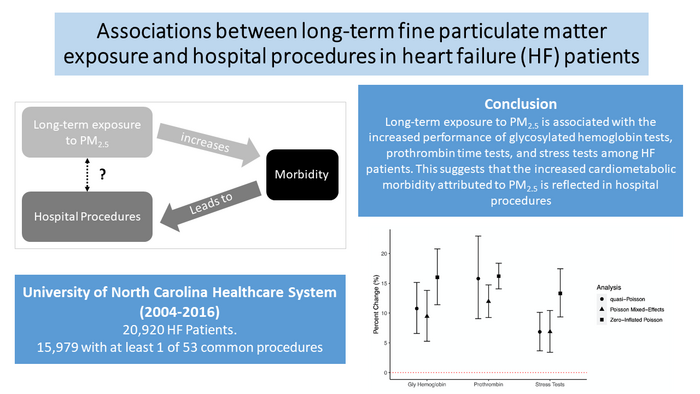Long-term exposure to fine particulate matter air pollution was associated with an increase in hospital procedures in heart failure patients, according to a study published May 3, 2023, in the open-access journal PLOS ONE by Samantha Catalano from the University of North Carolina at Chapel Hill, USA, and colleagues.

Credit: Samantha Catalano, CC-BY 4.0 (https://creativecommons.org/licenses/by/4.0/)
Long-term exposure to fine particulate matter air pollution was associated with an increase in hospital procedures in heart failure patients, according to a study published May 3, 2023, in the open-access journal PLOS ONE by Samantha Catalano from the University of North Carolina at Chapel Hill, USA, and colleagues.
Tiny airborne particles smaller than 2.5μm in diameter (PM2.5) are air pollutants generated by traffic, industry activity, combustion, and more. Though exposure to PM2.5 has been associated with illness and death worldwide, few studies have quantified this link using hospital procedures. In this study, the authors analyzed the effect of long-term PM2.5 exposure on hospital procedures in patients with heart failure.
The researchers examined electronic health records for 20,920 patients diagnosed with heart failure, 15,979 of whom subsequently received at least one of 53 common (frequency > 10%) procedures within the University of North Carolina Healthcare System from 2004-2016. Researchers used each patient’s address alongside the date of their heart failure diagnosis to map and analyze environmental exposure data alongside their health records.
The analysis revealed that three specific procedures were significantly more likely to be performed on patients with increased PM2.5 exposure: stress tests (6.84% increase per 1 μg/m3 increase in PM2.5), glycosylated hemoglobin tests, which screen for diabetes (10.8% increase), and prothrombin time tests, which evaluate blood clotting (15.8% increase). Prothrombin time tests remained significantly linked to this exposure even after adjusting for access to healthcare and healthy food based on county.
Since all three of these tests relate to diagnostic testing for cardiorespiratory health, the authors posit that their results provide evidence of patients with high PM2.5 exposure experiencing more cardiovascular morbidity, prompting healthcare professionals to perform more diagnostic tests.
The health records that form the basis of this research did not include individual-level socioeconomic data, nor data on procedures that may have been performed outside of the University of North Carolina Healthcare System (unless the records were transferred). Nonetheless, these results will assist future researchers in better estimating the burden of PM2.5 exposure on patients and hospital systems.
The authors add: “Associations between PM2.5 and hospital procedures can give us unique insight into the impacts of PM2.5 exposure on both patients and the healthcare system. We observed increased performance of diagnostic procedures with increased PM2.5 exposure, which fit with the known mechanisms of PM2.5 exposure. This research provides evidence that hospital procedures can be a unique lens through which to view the health effects of air pollution exposure.”
#####
In your coverage please use this URL to provide access to the freely available article in PLOS ONE: https://journals.plos.org/plosone/article?id=10.1371/journal.pone.0283759
Citation: Catalano S, Moyer J, Weaver A, Di Q, Schwartz JD, Catalano M, et al. (2023) Associations between long-term fine particulate matter exposure and hospital procedures in heart failure patients. PLoS ONE 18(4): e0283759. https://doi.org/10.1371/journal.pone.0283759
Author Countries: USA, China
Funding: This work was supported by Harvard participants grant RD‐835872‐01 from the US Environmental Protection Agency and grant UL1TR002489 from the National Center for Advancing Translational Sciences, National Institutes of Health (NIH). The funders had no role in study design, data collection and analysis, decision to publish, or preparation of the manuscript.
Journal
PLoS ONE
DOI
10.1371/journal.pone.0283759
Method of Research
Observational study
Subject of Research
People
Article Title
Associations between long-term fine particulate matter exposure and hospital procedures in heart failure patients
Article Publication Date
3-May-2023
COI Statement
I have read the journal’s policy and the authors of this manuscript have the following competing interests: Dr. Cavin Ward-Caviness is a scientific advisor for the Clock Foundation. The Clock Foundation had no role in any aspect of this manuscript. All other authors declare they have nothing to disclose.




